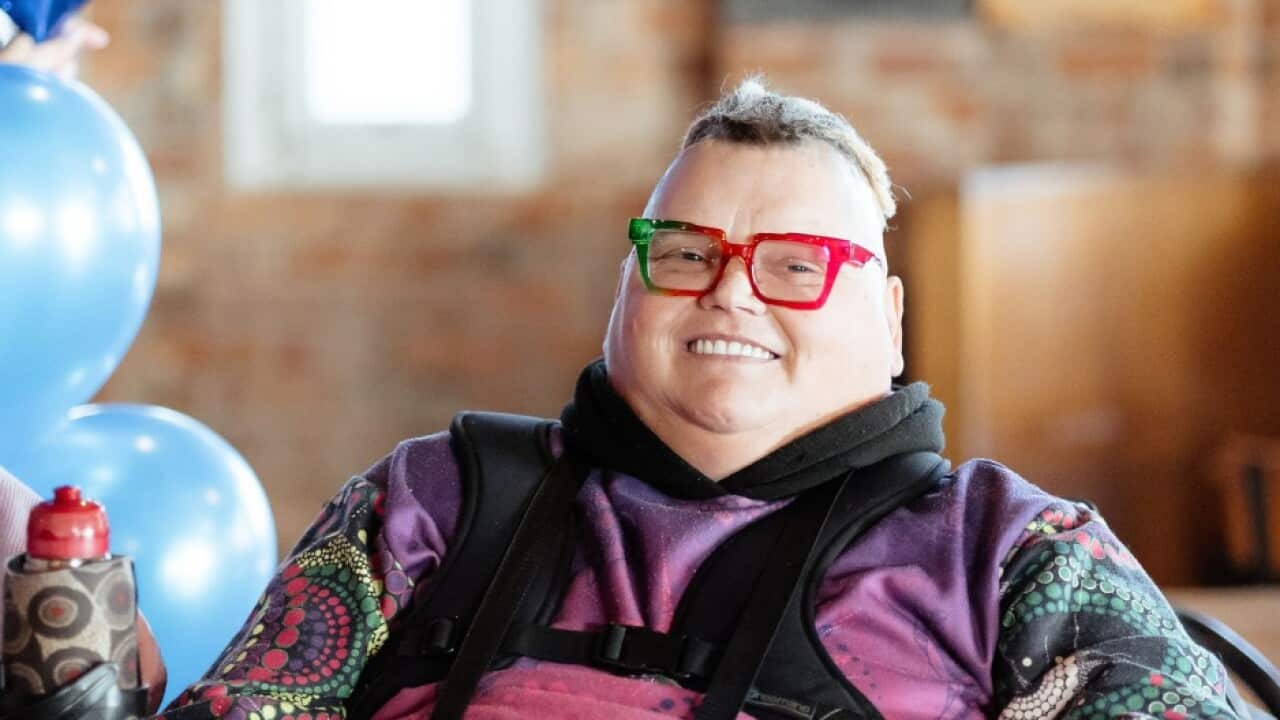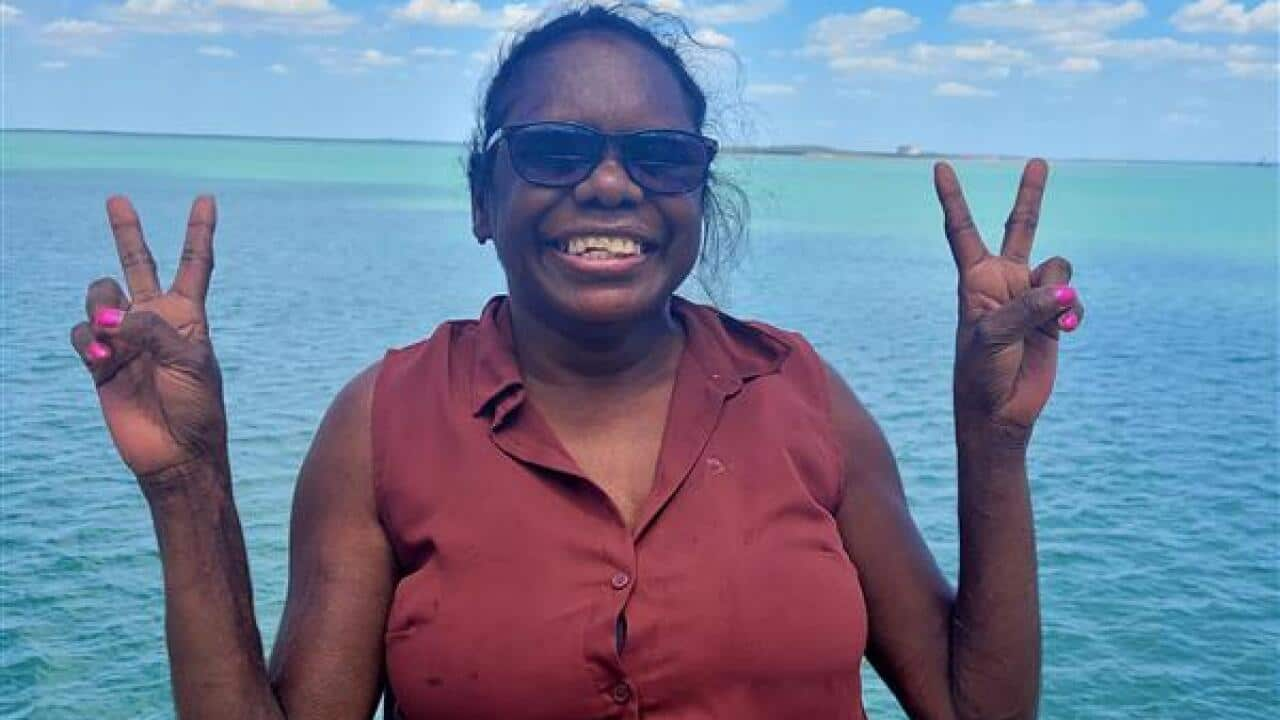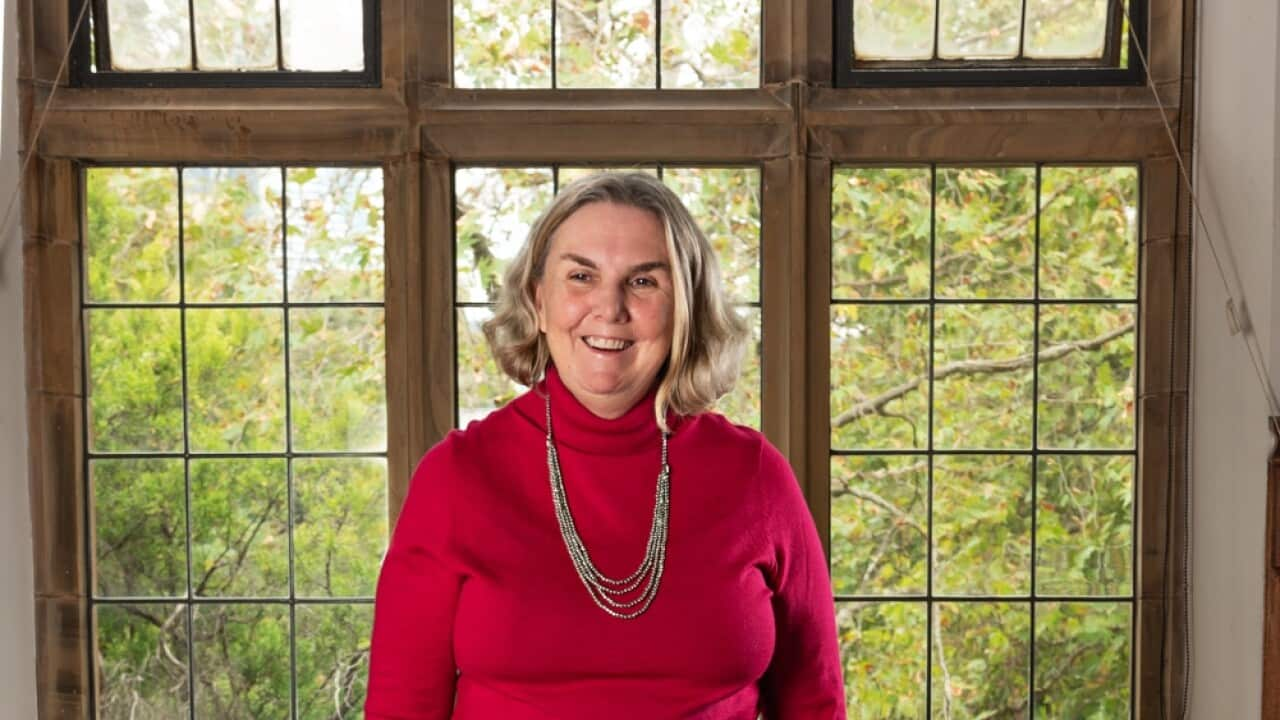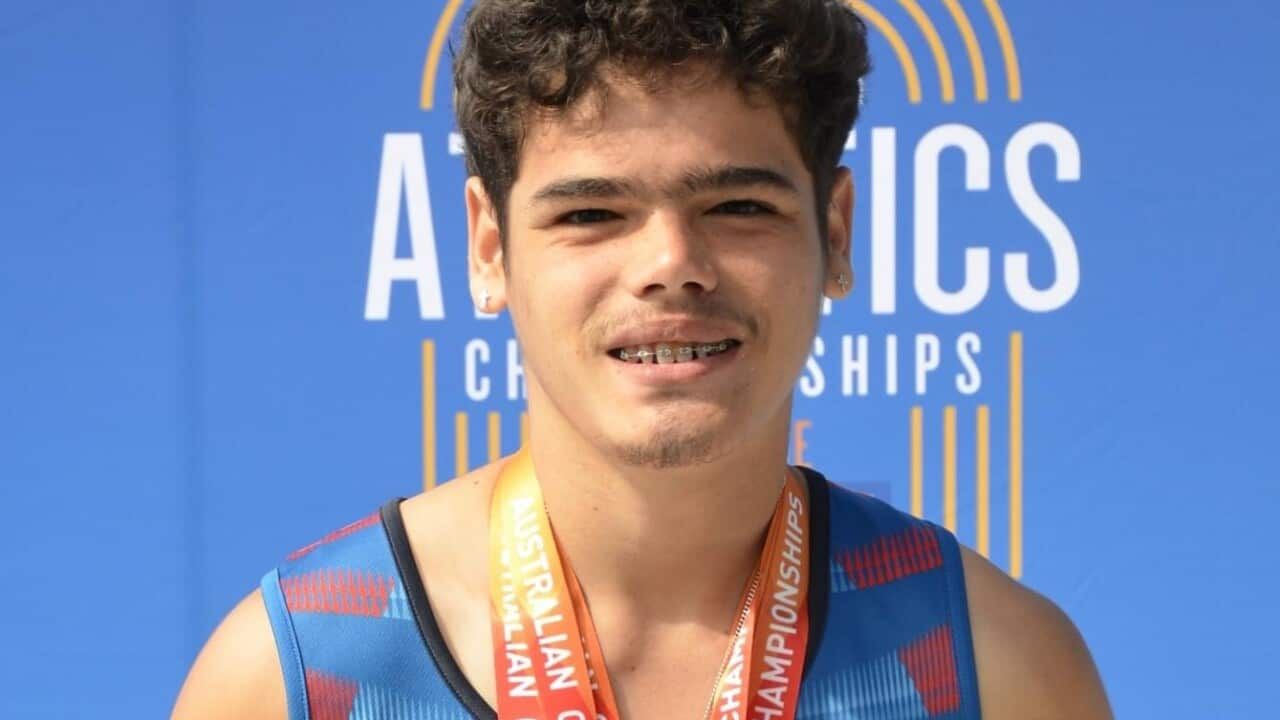Ngaire Pakai
Yaama, SBS acknowledges the traditional custodians of Country throughout Australia and pays respects to Elders past and present and ongoing in stewardship in knowledges since time immemorial.
Ngaire Pakai
Welcome to Speak My Language: Disability. Listen as we share stories of First Nations people who are engaging in their passions while living with a disability. Throughout this series you'll hear inspiring stories from leaders and advocates within the community who have successfully pursued their
dreams in their chosen fields.
Ngaire Pakai
I'm Ngaire Pakai and in this episode, I yarn up with Iconyx, a deadly musician from East Kimberley. Iconyx is a passionate songwriter, multi instrumentalist and co-producer who produces music through a deep connection to tactile sound, offering sighted audiences an immersive and powerful sonic
experience. As an artist who navigates the world without sight, her storytelling deeply influenced by her family roots of Kukatja, Pintupi mob and the life growing up in the city of Whadjuk, Noongar Boodja.
Ngaire Pakai
How are you going today?
ICONYX
Not too bad. Cheers for having me.
Ngaire Pakai
Can you give yourself a little bit of introduction here? Who are you? Who's your mob? Where you from?
ICONYX
So, I'm Iconyx, I'm 17 and I grew up on Whadjuk Country in, West Australia. And then my mum's side is Kukatja Warlpiri and my dad's side is Pintupi from the East Kimberley and around there.
Ngaire Pakai
Can you share with us how did you get your start in music?
ICONYX
So originally, I've played piano for about 10, 11 years. I started when I was 5. That was started by a set of those little play bells that have different notes and my auntie was testing me on the pitch and all of that. And that's how they found out I had perfect pitch because they just told me what
colours the bells were and then they'd have me pick the note from the colour. They'd tell me, pick the blue one, and I'd just know which note it was. And then they were playing ones at the same time. So two different ones. And then eventually it was three different ones and then, I'd have to name
all the colours. And yeah, that was how my piano started because then my cousin started teaching me how to play the piano. I then took up, vocal lessons when I was... 9, because I'd entered a singing competition over here and I came second place that year. But a friend who I'd made along the way at
the singing competition introduced me to her current singing teacher at the time. And so then I got in with the Boss Arts Crew, which is a not for profit organisation over here. And they have helped me record songs over the years. I did, my first actual recorded one was with a group of people or
group of kids and we put it out on Spotify years ago. And now I go back and I listen to that and I'm, I feel so shame. But it's also like, oh, that's cool, but shame. But I've been recording music properly since I was 10. And then I put my album out at the beginning of this year.
Ngaire Pakai
That's a huge accomplishment to put out an album this year, congrats. I know that culture is also very much entwined in your songs. How do you connect music and culture?
ICONYX
So one of the main songs I've done is a song by Dr. G, Yunupingu, and I learnt that for the NAIDOC back in 2000 and 18, 17? One of them. And I had learnt all the words in Yolngu and I got permission from his family to then record that. Well, I got first to sing it and then to record it. I learnt all
the words and then, his manager Michael actually called me up, to get some of the pronunciations and, I don't know how many times I'd listen back to that song, and I think the only one, I only had one word wrong and I was like, oh, okay, but the rest is fine? He's like, yeah. But culture, for me,
it's... there's a lot of pain in Australia, lots of pain at the moment as well. But I reckon music right now is a good way to release all of that. And then you go about the day trying to educate people instead of having big fight, big arguments and that. And I reckon if people just did everything
through music, it'd be way more cool.
Ngaire Pakai
Being someone who lives with blindness, how do you utilise, like, assistive technologies and tools to help you get into those creative spaces and make your music?
ICONYX
Okay, so I, I grew up using GarageBand on my iPad and so I'd just mess around and I used to mix stuff up all the time and then if I didn't like it, I'd redo it, redo it, redo it. But I loved how everything was so interactive. So I'd use GarageBand and I'd use my voiceover to just tell me which,
well, if I was on drums, guitars, strings, whatever I was using that day. But then my Auntie Charlie, she's got Ableton. She will, like, flick through all the different synths and everything. But she's got these cool touchpads that I can just tap away on and it's really cool because I can just
improvise whatever I want. And then there are buttons on the side where I can, I don't know, mess with the pitch, mess with the key, mess with the time signatures. It's like... I started off, how I put it, in like the Beginners - with my voiceover and an iPad and, voiceover is amazing because it
literally reads everything on the screen and sometimes that gets overwhelming. But it's all the information that someone who can see is getting. It's a lot easier than just randomly pressing buttons, I guess.
Ngaire Pakai
When it comes to your creative process, like with this last album, what kind of things did you use? Like, what kind of sounds were you looking for? Like, what's the vibe and the feeling that you like to put into your songs?
ICONYX
Oh, so I love to mix in an animal noise here and there. And I was, for one of my songs I used, wolves because there were no dingo sounds and I was so annoyed at that. But I love to put something that will like, that will not shock but will actually get people to listen. Because if you just randomly
hear, I don't know, an eagle at the beginning of a song, you're like, oh, what's going on there? Like, so I like to stand out with my music. I like sounds that are actually going to grab people's attention. So I go, I'll grab different animals. I'll get really cool bass lines and then sometimes I'll
find a bass line, and I'm gonna go, oh, I like that, but! And then I'll mess around with it. Sound wise, as individualised sound as I can possibly get. So sometimes I'll use, I'll use a like I said, animals. Or even like flicking the tab on a can of coke in a half drunk can, using that as like a
sort of hi hat instead. It's so cool. But I literally use everything around me. So yeah.
Ngaire Pakai
When people listen to your music, like you've got a bunch of songs that you've been putting out for years on YouTube but also with your album this year, what kind of experiences do you want listeners to have when they tune into you?
ICONYX
I want them to actually focus on the words and the music. I don't want it to be something that has to be specifically visual. Like I do do music videos sometimes, but I don't want it to just be a visual thing. I like, I'm hopefully gonna start doing my next music video soon, and that's gonna have
more a storyline. So I like to make a storyline with my music videos. I like there to be sounds behind it. I like for that to just make people actually listen and think about what they're hearing and, like, make sure it sticks in their head. Not just, oh, yeah, that's a good song, all right, next.
Ngaire Pakai
You've been in the creative space, like you've been making music and developing sounds and experimenting for a long time. What kind of advice would you give other people that want to get into music?
ICONYX
Oh, okay. Nothing is awful. Everything is amazing. Don't just, like you write something down and you think it sounds awful, but you'll come back to that later and you'll go, oh, actually, I like that. I like that. Or you'll make the weirdest mix on a mixing board and it's going to sound really weird
at the time, but then you'll come back and you'll go, oh, I like that. So don't just throw things out. Everything is, everything is an opportunity for something. Whether you have it now or whether it comes later. Just don't get rid of it. Keep it, keep it, keep it. And actually, like, don't say
that, eventually you will, just go for it, because if you don't go for it, it's probably not going to happen. Don't get rid of stuff that you write when you're, like really emotional or really pissy or really hungry, even. Like, I wrote an entire song because I wanted, like McDonald's. Like, it was
Ngaire Pakai
What kind of, advice would you give for people who also live with disabilities but want to stretch their creative muscles?
ICONYX
Don't assume that what your disability is, you can't do it. Because I, I love being able to mix music. I love being able to do stuff, like, because I did volunteer at a radio station, I loved being able to sit in the studio. And it doesn't matter if you can't see, if you've got, if you're
neurodivergent, if you've got a disability, you can actually do it. Don't just let people tell you that, oh, that's gonna be too hard. Actually find, there are people out there who will make it happen for you. So just don't, just don't let it pass you by. Like, if you want to make a song, actually
put the music together if you can. Or if you can't, find people that will help you put the music together. Don't just let it sit there. Because it's, don't let your disability be the reason that you can't do it.
Ngaire Pakai
What's something that really excites you at the moment? Are you looking forward to anything in the future?
ICONYX
Ooh, I have so many new songs ready to be recorded and I've just done a demo for one of them. I'm so psyched to actually put it all together and I should have an album out within the next year, again. Or some more songs at least. Whether or not it's a whole 'nother album, I don't know yet, but I'm
definitely looking forward to that. I'm also saving up for a new keyboard, so I can actually, because I've got my electric guitar here, but I want a keyboard that I can actually use and utilise that for. Because keyboards have cool sounds too, so I can, like mess around with making my own stuff and
plugging that into software. So I'm really psyched for that too.
Ngaire Pakai
And for people who are, like keen to listen, to follow your journey and find you, where can they find your music or find you online? Where can people go?
ICONYX
On Spotify, look up Iconyx I, C, O, N, Y, X, and it should come up with my music, that's also on YouTube Music, YouTube, Amazon Music. I'm on SoundCloud, don't know if I'm on Deezer, I will have to check that myself. For sure, Instagram, Facebook, ICONYX dot AU and on TikTok, for the same,
ICONYX dot AU. Definitely follow, listen, tell me what you like, tell me what you don't like, but for sure, I'm everywhere.
Ngaire Pakai
Thanks for coming on and having a yarn with me today.
Ngaire Pakai
Speak My Language Disability is an initiative funded by the Commonwealth of Department of Social Services. It is led by the Ethnic Communities Council of New South Wales and proudly delivered in partnership with SBS.





